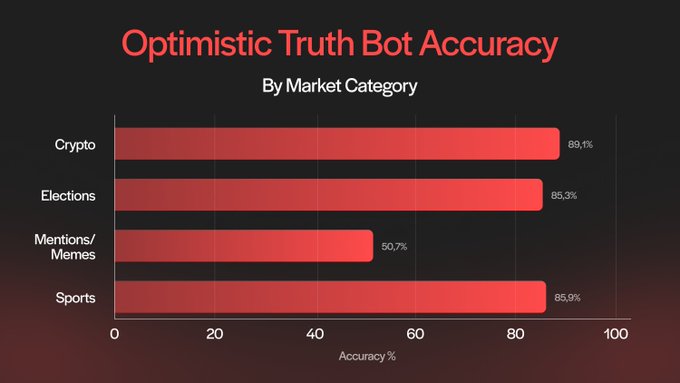UMA's AI Truth Bot Achieves 80-95% Accuracy in Prediction Markets
UMA's AI Truth Bot Achieves 80-95% Accuracy in Prediction Markets
🤖 When AI Plays Bookmaker

UMA's experimental @OOTruthBot has analyzed thousands of Polymarket prediction markets, showing promising results in determining outcomes. The bot achieves:
- 80% accuracy across all markets
- 95-100% accuracy on clear, unambiguous cases
- Exceptional performance in sports (especially soccer) and crypto price targets
- Strong results in election outcomes with official reporting
However, the bot struggles with:
- Narrative-heavy markets
- Ambiguous outcomes
- Meme-style predictions
Key finding: AI excels with structured, factual data but requires human oversight for nuanced interpretation. UMA's approach combines AI efficiency with human judgment for optimal results.
Follow @OOTruthBot to track live market proposals.
Can AI find the truth? UMA’s experimental @OOTruthBot has now reviewed thousands of @Polymarket prediction markets, and the results are very interesting. Here’s what we’ve learned about how AI handles sports, crypto, politics, and more ↴
The UMA Optimistic Oracle has shown us how humans reach consensus. How we collaborate, dispute, and converge on truth. Now it's time to test what happens when AI proposes the answers. Follow the experiment → @OOTruthBot More details in our latest blog below ↴
Polymarket NHL Stanley Cup Betting Volume Hits $250M

The Florida Panthers Stanley Cup Championship market on Polymarket has reached significant trading volume of approximately $250 million. The market is secured by UMA protocol, demonstrating growing interest in decentralized sports betting. This follows February's record-breaking Super Bowl market which exceeded $1B in volume, split between: - Kansas City Chiefs (53%) - Philadelphia Eagles (47%) These volumes indicate increasing mainstream adoption of decentralized prediction markets.
EigenLayer Launches EigenCloud: A New Era of Verifiable Cloud Computing
EigenLayer has announced EigenCloud, a groundbreaking platform for verifiable cloud computing. This development marks a significant evolution in blockchain infrastructure, enabling next-generation programmable applications with built-in verification capabilities. The concept has been in development since April 2024, when @sreeramkannan first outlined the vision: - Ethereum as Verifiable Internet - Rollups as Verifiable Web Servers - AVSs as Verifiable SaaS - EigenLayer as Verifiable Cloud EigenCloud aims to provide a foundation where trust is replaced by verification, potentially transforming how decentralized applications are built and deployed.
APIs can't tell you who won a debate. UMA can.
UMA's optimistic oracle system offers a novel solution for determining subjective outcomes like debate winners - something traditional APIs cannot handle effectively. The system works by having participants stake tokens on their claimed outcome. If no one disputes within a set timeframe, that becomes the accepted result. If disputed, token holders vote to determine the truth. - Enables decentralized consensus on subjective matters - Economic incentives encourage honest reporting - More reliable than centralized API solutions for complex judgments This approach aligns with Web3's vision of distributed truth-finding and could revolutionize how we reach consensus on debatable topics.
Real-world Events Now Secured Onchain Through UMA Protocol
UMA Protocol continues its mission of bringing real-world truth onchain through its optimistic oracle system. The protocol enables verification of real-world events and facts in a transparent, decentralized manner. Key developments: - Integration with prediction markets for truth verification - Scalable fact-checking infrastructure - Economic incentives for truth resolution - Front-running misinformation through profit opportunities The system allows participants to profit from resolving uncertainty while combating disinformation. This approach parallels Chainlink's consensus mechanisms for real-world events, creating a more robust ecosystem for onchain truth verification.

